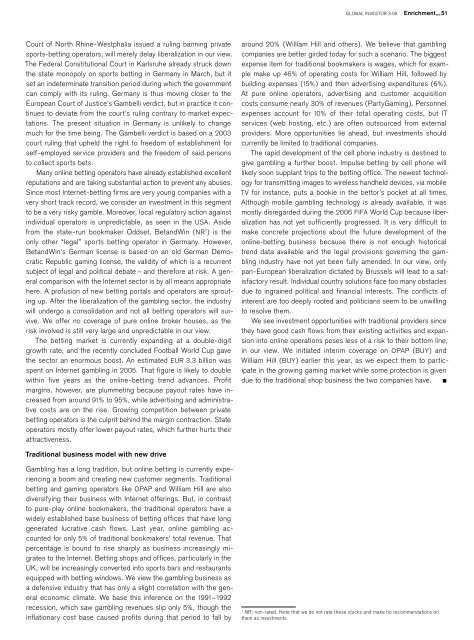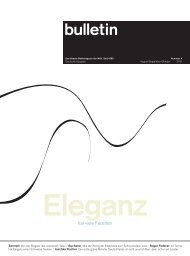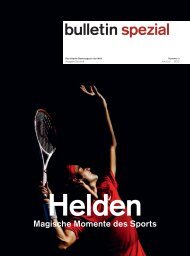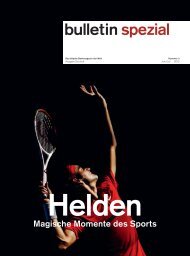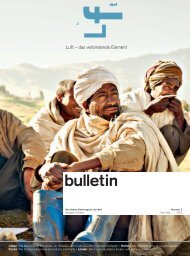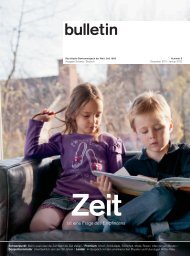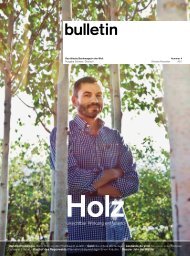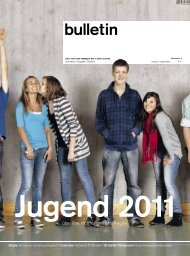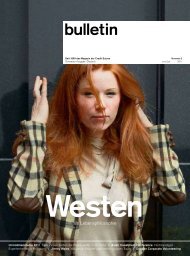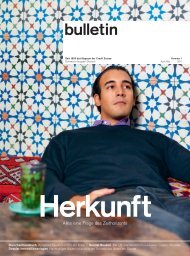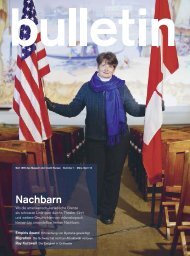Banking for 7 billion and 7 million
New challenges and opportunities of globalization Global Investor, 03/2006 Credit Suisse
New challenges and opportunities of globalization
Global Investor, 03/2006
Credit Suisse
You also want an ePaper? Increase the reach of your titles
YUMPU automatically turns print PDFs into web optimized ePapers that Google loves.
GLOBAL INVESTOR 3.06 Enrichment — 51<br />
Court of North Rhine-Westphalia issued a ruling banning private<br />
sports-betting operators, will merely delay liberalization in our view.<br />
The Federal Constitutional Court in Karlsruhe already struck down<br />
the state monopoly on sports betting in Germany in March, but it<br />
set an indeterminate transition period during which the government<br />
can comply with its ruling. Germany is thus moving closer to the<br />
European Court of Justice’s Gambelli verdict, but in practice it continues<br />
to deviate from the court’s ruling contrary to market expectations.<br />
The present situation in Germany is unlikely to change<br />
much <strong>for</strong> the time being. The Gambelli verdict is based on a 2003<br />
court ruling that upheld the right to freedom of establishment <strong>for</strong><br />
self-employed service providers <strong>and</strong> the freedom of said persons<br />
to collect sports bets.<br />
Many online betting operators have already established excellent<br />
reputations <strong>and</strong> are taking substantial action to prevent any abuses.<br />
Since most Internet-betting firms are very young companies with a<br />
very short track record, we consider an investment in this segment<br />
to be a very risky gamble. Moreover, local regulatory action against<br />
individual operators is unpredictable, as seen in the USA. Aside<br />
from the state-run bookmaker Oddset, Bet<strong>and</strong>Win (NR 1 ) is the<br />
only other “legal” sports betting operator in Germany. However,<br />
Bet<strong>and</strong>Win’s German license is based on an old German Democratic<br />
Republic gaming license, the validity of which is a recurrent<br />
subject of legal <strong>and</strong> political debate – <strong>and</strong> there<strong>for</strong>e at risk. A general<br />
comparison with the Internet sector is by all means appropriate<br />
here. A profusion of new betting portals <strong>and</strong> operators are sprouting<br />
up. After the liberalization of the gambling sector, the industry<br />
will undergo a consolidation <strong>and</strong> not all betting operators will survive.<br />
We offer no coverage of pure online broker houses, as the<br />
risk involved is still very large <strong>and</strong> unpredictable in our view.<br />
The betting market is currently exp<strong>and</strong>ing at a double-digit<br />
growth rate, <strong>and</strong> the recently concluded Football World Cup gave<br />
the sector an enormous boost. An estimated EUR 3.3 <strong>billion</strong> was<br />
spent on Internet gambling in 2005. That figure is likely to double<br />
within five years as the online-betting trend advances. Profit<br />
margins, however, are plummeting because payout rates have increased<br />
from around 91% to 95%, while advertising <strong>and</strong> administrative<br />
costs are on the rise. Growing competition between private<br />
betting operators is the culprit behind the margin contraction. State<br />
operators mostly offer lower payout rates, which further hurts their<br />
attractiveness.<br />
around 20% (William Hill <strong>and</strong> others). We believe that gambling<br />
companies are better girded today <strong>for</strong> such a scenario. The biggest<br />
expense item <strong>for</strong> traditional bookmakers is wages, which <strong>for</strong> example<br />
make up 46% of operating costs <strong>for</strong> William Hill, followed by<br />
building expenses (15%) <strong>and</strong> then advertising expenditures (6%).<br />
At pure online operators, advertising <strong>and</strong> customer acquisition<br />
costs consume nearly 30% of revenues (PartyGaming). Personnel<br />
expenses account <strong>for</strong> 10% of their total operating costs, but IT<br />
services (web hosting, etc.) are often outsourced from external<br />
providers. More opportunities lie ahead, but investments should<br />
currently be limited to traditional companies.<br />
The rapid development of the cell phone industry is destined to<br />
give gambling a further boost. Impulse betting by cell phone will<br />
likely soon supplant trips to the betting office. The newest technology<br />
<strong>for</strong> transmitting images to wireless h<strong>and</strong>held devices, via mobile<br />
TV <strong>for</strong> instance, puts a bookie in the bettor’s pocket at all times.<br />
Although mobile gambling technology is already available, it was<br />
mostly disregarded during the 2006 FIFA World Cup because liberalization<br />
has not yet sufficiently progressed. It is very difficult to<br />
make concrete projections about the future development of the<br />
online-betting business because there is not enough historical<br />
trend data available <strong>and</strong> the legal provisions governing the gambling<br />
industry have not yet been fully amended. In our view, only<br />
pan-European liberalization dictated by Brussels will lead to a satisfactory<br />
result. Individual country solutions face too many obstacles<br />
due to ingrained political <strong>and</strong> financial interests. The conflicts of<br />
interest are too deeply rooted <strong>and</strong> politicians seem to be unwilling<br />
to resolve them.<br />
We see investment opportunities with traditional providers since<br />
they have good cash flows from their existing activities <strong>and</strong> expansion<br />
into online operations poses less of a risk to their bottom line,<br />
in our view. We initiated interim coverage on OPAP (BUY) <strong>and</strong><br />
William Hill (BUY) earlier this year, as we expect them to participate<br />
in the growing gaming market while some protection is given<br />
due to the traditional shop business the two companies have. <br />
Traditional business model with new drive<br />
Gambling has a long tradition, but online betting is currently experiencing<br />
a boom <strong>and</strong> creating new customer segments. Traditional<br />
betting <strong>and</strong> gaming operators like OPAP <strong>and</strong> William Hill are also<br />
diversifying their business with Internet offerings. But, in contrast<br />
to pure-play online bookmakers, the traditional operators have a<br />
widely established base business of betting offices that have long<br />
generated lucrative cash flows. Last year, online gambling accounted<br />
<strong>for</strong> only 5% of traditional bookmakers’ total revenue. That<br />
percentage is bound to rise sharply as business increasingly migrates<br />
to the Internet. Betting shops <strong>and</strong> offices, particularly in the<br />
UK, will be increasingly converted into sports bars <strong>and</strong> restaurants<br />
equipped with betting windows. We view the gambling business as<br />
a defensive industry that has only a slight correlation with the general<br />
economic climate. We base this inference on the 1991–1992<br />
recession, which saw gambling revenues slip only 5%, though the<br />
inflationary cost base caused profits during that period to fall by<br />
1<br />
NR: non-rated. Note that we do not rate these stocks <strong>and</strong> make no recommendations on<br />
them as investments.


